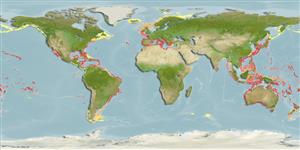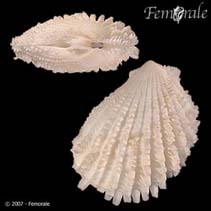Lima lima (Linnaeus, 1758)
Spiny fileclam| Native range | All suitable habitat | Point map | Year 2050 |

|
| This map was computer-generated and has not yet been reviewed. |
| Lima lima AquaMaps Data sources: GBIF OBIS |
Classification / Names Populärnamn | synonymer | CoL | ITIS | WoRMS
Bivalvia | Limida | Limidae
Environment: milieu / climate zone / djupintervall / distribution range Ekologi
; djupintervall 4 - 200 m (Ref. 2754). Tropical
Distribution Länder | FAO områden | Ekosystem | Förekomster | Utplanteringar
Indo-Pacific, Atlantic Ocean and the Mediterranean. Tropical to subtropical climates.
Length at first maturity / Size / Weight / Age
Könsmognad: Lm ? range ? - ? cm Max length : 9.0 cm SHL hane/ej könsbestämd; (Ref. 80041)
Life cycle and mating behavior Könsmognad | Reproduktion | Lek | Eggs | Fecundity | Larvae
Main reference
referenser | Koordinator | Medarbetare
Demir, M. 2003 Shells of mollusca collected from the seas of Turkey. Turkey Journal of Zoology 27:101-140. (Ref. 2754)
IUCN Red List Status
(Ref. 130435: Version 2025-1)
CITES status (Ref. 108899)
CMS (Ref. 116361)
Threat to humans
Human uses
| FishSource |
Verktyg
Ytterligare information
Födosammansättning
Födointag
Predatorer
Max. ages / sizes
Length-weight rel.
Length-length rel.
Length-frequencies
Mass conversion
Abundans
Internet-källor
BHL | BOLD Systems | CISTI | DiscoverLife | FAO(Publication : search) | Fishipedia | GenBank (genome, nucleotide) | GloBI | Gomexsi | Google Books | Google Scholar | Google | PubMed | Tree of Life | Wikipedia (Go, sök) | Zoological Record



